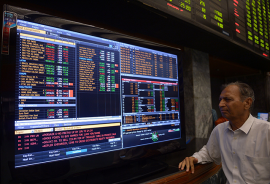One of the surest signs of this came last week with the release of Pakistan Automobile Manufacturers Association figures which showed that sales of domestically manufactured vehicles increased by 80 per cent in March, compared to the same month last year. For the first nine months of the fiscal year ending June 30, 2010, sales increased by 34 per cent over the same period last year.
A rise in the demand for both larger and smaller vehicles is an indicator of the fact that the economy may well be on its way to recovery — and this should be bode well for the government’s macroeconomic targets for 2011.
Whether the government is able to translate this into higher revenues is somewhat less certain but the imposition of the value-added-tax, coupled with the turnaround in large scale manufacturing should help the government reduce the fiscal deficit in the coming years.
Large-scale manufacturing had suffered last year and since it generally provides better-paying employment opportunities than agriculture, it should be encouraged by the government. Yet the government’s policies so far seem to focus on giving in to the short-term demands of various industrial lobbies rather than focussing on long-term competitiveness.
For example, the government will willingly ban or place high tariffs on foreign products rather than working towards solving the chronic energy crisis which would go a long way towards helping domestic manufacturers compete at the global level. Such misguided policies, which deliver short term benefits at the expense of long term viability, need to be curbed if exports are to be increased.



1725030039-0/Untitled-design-(2)1725030039-0-165x106.webp)
1725366721-0/kyle-(1)1725366721-0-165x106.webp)



1732084432-0/Untitled-design-(63)1732084432-0-270x192.webp)








COMMENTS (1)
Comments are moderated and generally will be posted if they are on-topic and not abusive.
For more information, please see our Comments FAQ